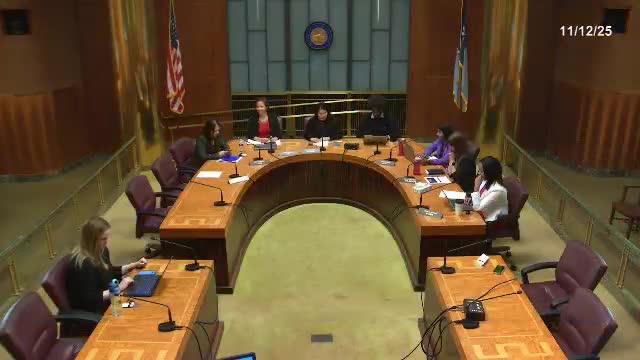Saint Paul presents 2026'2030 five-year capital plan; Common Sense program staged over 20 years
Get AI-powered insights, summaries, and transcripts
Subscribe
Summary
Public Works presented a draft five-year (2026'2030) capital plan and the 20-year Common Sense local sales-tax program, describing annual funding streams, major 2026 projects and a staffing-versus-consultant strategy; staff warned a metro delivery fee shortfall will tighten near-term local match capacity.
Public Works Director Sean Kershaw and staff presented Saint Paul's draft five-year capital plan for 2026'2030 to the City Council Budget & Finance Committee, highlighting funding sources, major 2026 reconstruction projects and staging for the 20-year Common Sense local sales-tax program.
"Happy to present our 5 year plan to you today for the next 5 year term of 2026 to 2030," said Nick Peterson, Public Works, at the start of the presentation. Peterson said the plan shows funding across five years but noted "there's just one year of funding that comes with it," signaling that the department will focus on confirmed 2026 dollars while programming later years as revenue projections firm up.
Peterson detailed recurring city programs that fund streets: annual street reconstruction bonds (about $12,500,000 for reconstruction plus $3,000,000 for residential mill-and-overlay, "a total of 15 and a half million dollars" annually), municipal state aid (MSA) funded primarily by the state gas tax and limited to MSA routes, capital improvement bonds for items such as sidewalk grinding, and the Common Sense local-option sales tax (three-quarters of 1 percent) dedicated to a 20-year corridor plan.
The presentation emphasized project scale and complexity. "If we were to add up all the projects we're doing, including bridges, it's somewhere on the order of $200,000,000 for construction," Peterson said, describing this as an "enormous year." He used a photo of downtown Robert Street to explain why reconstruction there is especially complicated: extensive buried utilities require ground-penetrating radar, potholing and careful sequencing of deep work before surface restoration.
Program staging and delivery: Ruben Collins, Transportation Planning Manager, outlined how Common Sense corridors will be split into shorter segments for delivery. "We think we can deliver about three separate projects each calendar year through the Common Sense program," Collins said, adding that the city expects internal staffing capacity to be the primary constraint on pace and that longer corridors (for example a three-mile line) will be split into multiple projects delivered across years.
Staffing and consultants: Council members asked whether the city should hire more in-house engineering staff rather than rely on outside consultants. Kershaw and Collins said the city is pursuing both approaches. "There are benefits to both and as Ruben Collins said, we are doing both," Kershaw said, explaining that large reconstruction projects often require consulting engineering that can amount to roughly 25'30% of construction cost; hiring consultants can speed delivery during the current "sprint" of work while the city builds internal capacity for the long-term Common Sense program.
Revenue uncertainties: Peterson and staff raised a near-term funding concern for the Transportation Advancement Account (TAA) metro delivery fee, which the department had counted on for local match. Peterson said staff had expected about $740,000 for the year but now anticipate closer to $400,000, a shortfall that will constrain uses previously planned for that revenue source.
Project examples and 2026 priorities: Staff highlighted 2026 projects slated for construction including University, Earl and Pelham corridors, plus repair and safety work such as Cleveland railroad crossing improvements (the crossing project cost was cited at over $350,000 for two crossings). Staff also noted a partnership with Metro Transit that will accelerate mill-and-overlay work on Selby to meet a funding deadline: bituminous work will occur in 2026 and concrete work will follow in 2027 to preserve Metro Transit's expiring funding.
Next steps and oversight: Staff said the five-year plan is revisited annually and the city will not program a project unless it has identified funding to deliver it. The Common Sense program will be presented to the public with a programming plan and district-level engagement; Collins said the department plans staged five-year windows to retain flexibility over a 20-year horizon. The presentation will come to full City Council for approval on Dec. 3.
No motions or votes were taken in the committee meeting; Council members requested follow-up materials on current project balances and revenue-to-actual tracking for capital programs.
